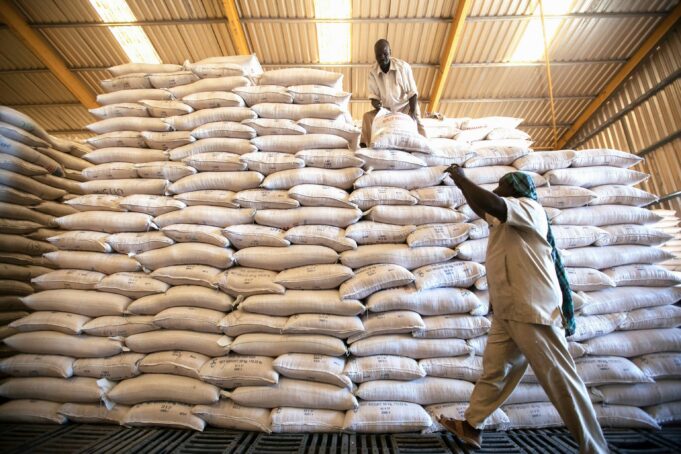I’ve been examining news of Africa’s growing food shortage, particularly brought on by the war between Russia and Ukraine. I reflect that what is happening has more to do with dependency on European and American systems of agricultural imperialism or “exporting commodities,” instead of the Motherland growing food stuffs as the staple for internal consumption.
Carlos Lopes, a development economist from Bissau-Guinea and professor at the Mandela School, University of Cape Town, told German news service DW, in part, that “economic policies of African countries (have) been oriented towards exporting commodities that’s producing rent for the elites rather than dealing with the rest of the economy.”

Putting an exclamation point on the above, Dr. Anthony Monteiro, a W.E.B. Du Bois scholar and creator of the Philadelphia based “Free School,” told me via a text message: “The African crisis is a political crisis and has been for decades. A pro-west neocolonial governing class is the issue.”
Let me digress. The African Development Bank Group President Dr. Kinwumi A. Adesina addressed the recent G7 (an inter-governmental political forum consisting of Canada, France, Germany, Italy, Japan, the United Kingdom and the United States) meeting of heads of state in Schloss Elmau via videoconference.
He urged Germany and other G7 countries to support a $1.5 billion African Emergency Food Production plan developed jointly by the bank and the African Union to help African countries avert a looming food crisis, partially brought on by war between Russia and Ukraine.
“While the African Development Bank has mobilized $1.3 billion of the $1.5 billion needed for the African Emergency Food Production Plan, we have a financing gap of $200 million. I would therefore like to request that Germany and all G7 countries help provide this balance of $200 million,” the bank chief said, according to posting on ADB’s website.
Africa’s agricultural problems can be summed by traveling to Darfur in Western Sudan. Darfur, where there is food and where this author has visited, is priced out of reach for most local consumers. Before the war in Ukraine, reported DW news, prices had increased by 700 percent. This year prices increased by another 200 percent. “For millions in Sudan and sub-Saharan Africa the situation is becoming unbearable,” the news site reported.
Salwa Salim Arbab, who resides in an Internal Displaced Persons (IDP) camp in Darfur, told DW news, “Since last year the UN has stopped food distribution to us. More than 75 percent of people in this camp have been left out of UN system. The few people that still get food aid have their rations cut by 20 percent.”
In another case reported by DW, a mother with five children walked for months to get to safety in an Eastern Darfur camp. Since then, she said she and her five children have all been dependent on food handouts. But in the last few months this aid has practically dried up.
Much of this agricultural aid has dried because those commodities, according to the World Food Program, were produced in Ukraine. In other words, food aid dependent Africa is depending on agriculture goods from Ukraine who is now dependent on food aid.

David Beasley, executive director of the World Food Program, stated: “When a nation (Ukraine) that is the breadbasket of the world becomes a nation with the longest bread line of the world, we know we have a problem.”
Even before the Ukraine crisis struck, the world was already facing an unprecedented, perfect storm because of conflict, climate change and the COVID-19 pandemic. Over the course of several years, the number of people marching to starvation has ballooned from 80 million to 323 million, with 49 million at risk of famine in 43 countries, Beasley said, noted on the UN’s news site.
Professor Lopes blames African elites and formal colonial masters for treating agriculture on the continent as a social area, not as an economic opportunity.
“The policies … put in place by both the countries and donors to deal with the primary sector have very much (been) reliable on how to address issues of resilience, vulnerabilities, poverty reduction, but not necessarily transformative in terms of increasing productivity and making sure that African agriculture is modernized and benefits from technology like irrigation,” he told DW.
Lopes demanded Africa not only be treated when there is a crisis. He mentioned currently there is “a crisis of drought,” “a crisis provoked by inflation,” and “a crisis because of limited access of food from Ukraine and Russia.”
According to Lopes, “We need to deal with the issues in a structural manner, not with a short-term vision as it’s been mostly the case.” He added, “We need to stop this food security interpretation that is dealing basically with immediate needs rather than introducing the changes that are required for agriculture to be a part of the growth story in Africa.”
So, all this talk from Adesina of the African Development Bank and the request for money from the G7, he says the continent got $1.3 billion for emergency food production plan. If these funds aren’t geared toward making Africa agriculturally self-sufficient, which means getting the continent off the mammary glands of European and American aid dependency, then what’s the point?
Follow @JehronMuhammad on Twitter













